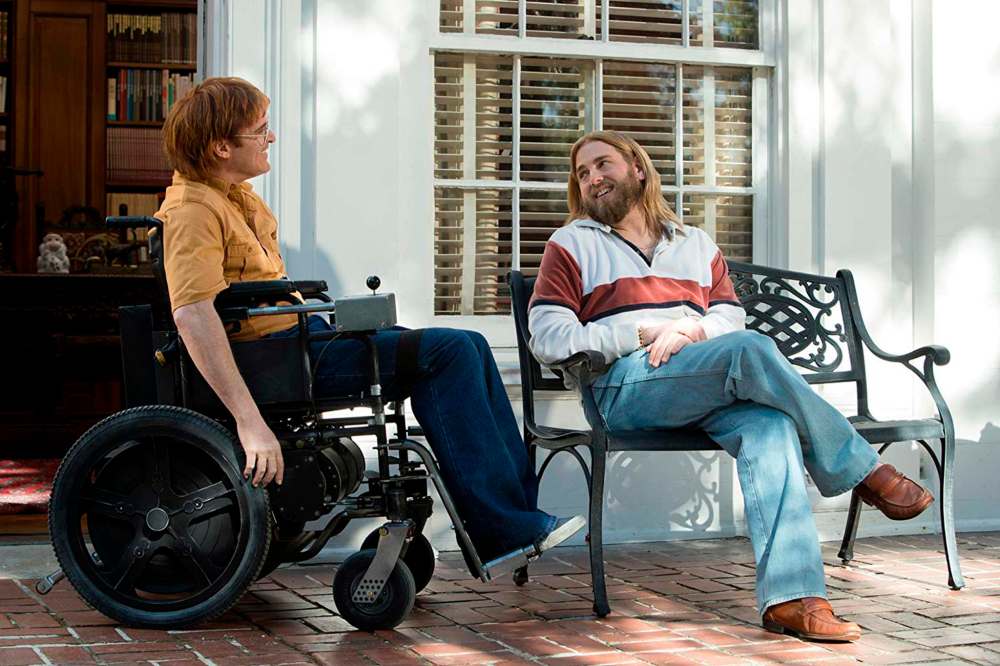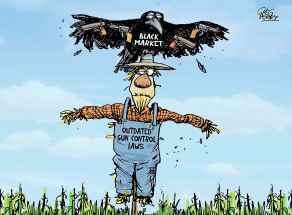Biopic compels but can’t follow through Tale of paralyzed cartoonist lacking despite director's sensitivity and star's commitment
Read this article for free:
or
Already have an account? Log in here »
To continue reading, please subscribe:
Monthly Digital Subscription
$0 for the first 4 weeks*
- Enjoy unlimited reading on winnipegfreepress.com
- Read the E-Edition, our digital replica newspaper
- Access News Break, our award-winning app
- Play interactive puzzles
*No charge for 4 weeks then price increases to the regular rate of $19.00 plus GST every four weeks. Offer available to new and qualified returning subscribers only. Cancel any time.
Monthly Digital Subscription
$4.75/week*
- Enjoy unlimited reading on winnipegfreepress.com
- Read the E-Edition, our digital replica newspaper
- Access News Break, our award-winning app
- Play interactive puzzles
*Billed as $19 plus GST every four weeks. Cancel any time.
To continue reading, please subscribe:
Add Free Press access to your Brandon Sun subscription for only an additional
$1 for the first 4 weeks*
*Your next subscription payment will increase by $1.00 and you will be charged $16.99 plus GST for four weeks. After four weeks, your payment will increase to $23.99 plus GST every four weeks.
Read unlimited articles for free today:
or
Already have an account? Log in here »
Hey there, time traveller!
This article was published 26/07/2018 (2698 days ago), so information in it may no longer be current.
Based on the true story of John Callahan — the Portland, Ore.-based cartoonist paralyzed from the neck down after a car crash at age 21, who kicked his alcoholism and started drawing — this unusual drama avoids almost all the clichés of the inspirational-biopic genre.
Movie review
Don’t Worry, He Won’t Get Far on Foot
Starring Joaquin Phoenix, Rooney Mara and Jonah Hill
McGillivray
14A
115 minutes
★★★1/2 stars
Don’t Worry, He Won’t Get Far on Foot
Starring Joaquin Phoenix, Rooney Mara and Jonah Hill
McGillivray
14A
115 minutes
★★★1/2 stars
Other voices
Leave it to filmmaker Gus Van Sant to make a film about a hopeless drunk who becomes a quadriplegic into a story that’s funny, dark, sad, sweet and even sort of inspirational.
— Bruce DeMara, Toronto Star
A movie that’s supposed to inspire winds up being irritating instead.
— Ann Hornaday, Washington Post
The film, loosely adapted from Callahan’s life, is as divisive as his work, sure to be considered brutally funny by some and brutally insensitive by others.
— Colin Covert, Minneapolis Star Tribune
It’s not convincing that Callahan’s well-being is truly at stake. Yet the movie is vital, with a pleasantly loose-flowing tone and message that art and humour can mend the spirit.
— Anita Katz, San Francisco Examiner
Staggering between corny conventionality and zesty, upbeat weirdness, Don’t Worry never fully acknowledges the cruelty and selfishness required to sustain a longtime habit.
— Jennette Catsoulis, New York Times
Still, director Gus Van Sant can’t quite match the sharp, dark, polarizing power of Callahan’s own work, which resolutely rejected the pity and forced sentimentality that sometimes surrounds disability. This is, after all, a guy who titled his autobiography Will the Real John Callahan Please Stand Up?
Van Sant (Gerry, Elephant, Last Days, Milk), whose indie work during the past 15 years or so has been uneven and unpredictable but often interesting, uses an impressionistic style in which sudden, vivid images and moments are loosely connected by a saggy story structure.
The film’s shape, such as it is, comes instead from an unsparing central performance by Joaquin Phoenix (The Master, Her, Irrational Man) and strong support from an eclectic ensemble cast.
We see John as a young man — and Phoenix may be incredible, but his range doesn’t quite extend to passing as a 21-year-old — sneaking some tequila on the way back from a morning liquor-mart run.
He drinks his way through a fuzzy day, and later runs into Dexter (Jack Black, in party mode). Their fateful, drunken night ends with them both stumbling into a car and Dexter hitting a tree at high spped.
Dexter walks away with a few bruises. John is left paralyzed from the neck down, with some limited movement in his arms.
Then, it’s rehabilitation and a squalid domestic setup with an erratic caregiver, which involves John with a medical establishment and social-assistance authorities who are portrayed as almost uniformly awful. One doctor sums up John as a “C5-C6,” without even bothering to say his name.

A low point comes when the wheelchair-bound John is left home alone with liquor bottles he can’t reach. Ultimately, he realizes that what’s keeping him from leading a full life is not his quadriplegia but his alcoholism.
He joins Alcoholics Anonymous and starts working the program, and the complicated back-and-forth of addiction and recovery makes for the most compelling section of the film.
John gets support from his girlfriend Annu (Rooney Mara). A composite character based on several women in Callahan’s life, she feels like a composite character. Donnie (Jonah Hill), on the other hand, John’s louche, wealthy AA sponsor, is unique.
Van Sant tracks some tricky dynamics as Donnie practises a particularly bitchy form of tough love with his group. These scenes are psychologically acute, and the participants are played by a fascinating bunch of actors, including Udo Kier, cultie muse of Andy Warhol and Guy Maddin; queer-punk musician Beth Ditto; and Kim Gordon, Sonic Youth star and all-round experimental icon, here playing a polished former trophy wife.

Meanwhile, John keeps drawing cartoons, viewed as hilarious by some and offensive by others, with a rough, edgy style that suits his subject matter.
Some of these drawings, brought to life in animated vignettes, add a little energy to John’s story, as do scenes in which he speeds around the sidewalks and streets of Portland in his motorized wheelchair, driving like a maniac.
Unfortunately, the film as a whole stalls out in the second half.
Van Sant’s approach is sensitive and Phoenix’s work is committed, but the invigorating anger of Callahan himself is lacking.
alison.gillmor@freepress.mb.ca

Studying at the University of Winnipeg and later Toronto’s York University, Alison Gillmor planned to become an art historian. She ended up catching the journalism bug when she started as visual arts reviewer at the Winnipeg Free Press in 1992.
Our newsroom depends on a growing audience of readers to power our journalism. If you are not a paid reader, please consider becoming a subscriber.
Our newsroom depends on its audience of readers to power our journalism. Thank you for your support.









